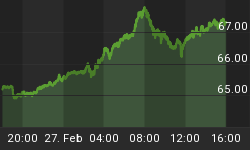So-called bank "bail-ins", whereby losses are imposed on depositors, represent the next stage in the modus operandi of the political class in response to the ongoing solvency crisis in the state and financial sectors. I must say that the concept whereby thinly capitalized government agencies purport to guarantee trillions in deposits with billions in capital has always been implausible as an insurance scheme. There is nothing resembling insurance about it. It is simply another unfunded government guarantee which in an age of insolvent states is being revealed, along with many other such guarantees, as the fiction it always was.
The balance sheet of the bank in which you deposit/lend your hard-earned savings should always be a matter of keen interest to you. Any scheme that supposedly de-risks deposits without truly reflecting the cost of removing such risks is just allowing them to accumulate to unsustainable levels - with predictable consequences as we have seen in Cyprus.
I do believe some good will come of the events in Cyprus. Middle class savers have had their eyes opened and are now being forced to pay attention to:
-
bank balance sheets - deposit insurance schemes are a global fiction which, in part, have allowed modern banks to become the highly leveraged, opaque, risk agglomerating machines that they are;
-
alternatives to bank deposits as capital preservation tools with consequences for the velocity of money and inflation; and
-
the risk of outright wealth confiscation and sudden capital controls as the new in extremis method of financing bankrupt states.
In a free market for banking, deposit rates would vary widely allowing accurate distinctions to be made amongst competing institutions. Risky banks would be forced to pay commensurately high rates to attract depositors, while less risky banks would pay lower rates. Depositors would then be secure in the knowledge that rates would reflect the aggregate risk of the deposit taking entity not the intervention of an unfunded state subsidy. Price discovery in the deposit market is a critical and missing piece of the puzzle for todays savers - which banks are safe, which are not, where do you park your cash with minimal risk of loss? In a global market of effectively uniform deposit rates there are no accurate signals with which to make this decision. We need to allow the markets to signal bank risk though deposit rates which in turn would act much more quickly than current mechanisms to deprive banks of critical capital if they are taking excessive risk.
There has been much discussion about the collapse of the velocity of money since 2008. Despite certain reservations that the concept of the velocity of money may be simply an accounting identity with no real existence outside of economics textbooks, there has certainly been an increased preference on the part of the middle class to hold money balances with the idea that deposits at banks, although they generate meagre returns, will not generate nominal losses.
That fiction is being stripped away. Middle class wealth is the only the source of funds to bail out the insolvent state and financial sectors and what remains of that capital is largely held in bank deposits and pension plans. To date, it has been sufficient to "appropriate" this wealth slowly via negative real interest rates, but as events move progressively more swiftly in the bankrupt developed world, the well proven gradual process appears to be failing to yield the requisite funds - hence the transition to bail-ins and outright deposit confiscation. A steady 5-6% a year real interest rate tax is not sufficient when 30% or more is required overnight.
Where such confiscations are imposed, capital controls will not be far behind in order to prevent any remaining middle class wealth from fleeing, worsening state and financial sector solvency further and depriving the political class of future emergency funds. Will the next stage of the developed world financial crisis witness confiscatory bail-in schemes followed by severe clampdowns on all ways to get capital to safe harbours?
This leads me to my point on the velocity of money. If bank deposits are finally revealed to be vastly more risky than the 1-2% nominal interest rates they provide and capital flight is going to be progressively more difficult, then perhaps we are about to see an increase in the velocity of money, whereby middle class capital rotates into real assets outside of the financial system - passive, un-leveraged hard asset investments with reliable cash generating capacity where possible. Think of the growing interest in investing in farmland and other productive assets as examples. Time will tell, but we may look back on the events in Cyprus as the catalyst for an upswing in headline rates of inflation - at least in real assets. Ask yourself if a physical gold holding is now really more risky than a European bank deposit and the consequences this may have on nominal real asset prices?
Kind Regards
Cantillon's Curse: Stephen Johnston, the founder of Agcapita, has published his book Cantillon's Curse which is now available on Amazon - it is a series of discussions on macro themes including:
- stagflation;
- demographics;
- sovereign insolvency;
- bailouts and the law of unintended consequences;
- agriculture;
- EROEI; and
- the retreat of financialization among others.
All profits will be donated to charity.















